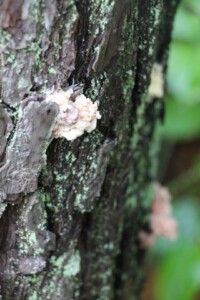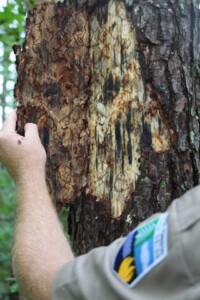FOR IMMEDIATE RELEASE
MAY 31, 2023
The Georgia Forestry Commission (GFC) is urging residents in four Georgia counties to be on the lookout for damage signs from the destructive southern pine beetle (SPB). In a recent survey by GFC foresters, Echols, Twiggs, Dawson, and Greene Counties were identified as locations with the highest probabilities of experiencing an SPB outbreak this year.
 “We want to get this information out to landowners,” said Georgia Forestry Commission Forest Health Coordinator Lynne Womack, “because there are certain things that can be done to prevent and control outbreaks. Now through fall is the time to inspect carefully and take action, if needed.” While Georgia has not experienced a severe outbreak in over a decade, in the past, southern pine beetle populations have decimated thousands of acres of forestland, feeding on trees’ inner tissues, causing tree mortality and financial losses. Signs of beetle activity include the presence of “pitch tubes” in the bark and “galleries,” or the marked trail of beetles, underneath the bark.
“We want to get this information out to landowners,” said Georgia Forestry Commission Forest Health Coordinator Lynne Womack, “because there are certain things that can be done to prevent and control outbreaks. Now through fall is the time to inspect carefully and take action, if needed.” While Georgia has not experienced a severe outbreak in over a decade, in the past, southern pine beetle populations have decimated thousands of acres of forestland, feeding on trees’ inner tissues, causing tree mortality and financial losses. Signs of beetle activity include the presence of “pitch tubes” in the bark and “galleries,” or the marked trail of beetles, underneath the bark.
Every spring the GFC participates in a special trapping program that collects samples from counties throughout Georgia so that SPB activity and damage levels can be anticipated and mitigated. This trapping protocol, along with a new prediction model, have proven accurate in predicting SPB activity. Fifty traps were placed across the state to coincide with redbud bloom (early to mid-March) and six weekly samples were collected from each trap to provide a weekly average count. The average number of SPB per-trap per-day was 16.5, which is considered in the low range.
Echols County had the greatest overall SPB per-trap per-day catch at 146.7, placing it in the high category of locations with more than 81 spots. Twiggs County also registered more than 81 average per-trap per-day counts. Dawson and Greene Counties had counts greater than 50 but fewer than 80. Eleven counties, Carroll, Clarke, Heard, Jones, Morgan, Oconee, Oglethorpe, Randolph, Stewart, Webster, and Wilkinson had SPB per-trap per-day counts greater than 20 but fewer than 50. All these counties are in the low range for SPB per trap per-day.
“With the exception of Echols and Twiggs Counties, we expect SPB activity overall to be low this year,” said Womack. “Good forest management practices can make tracts less attractive to these beetles, and that includes thinning, prescribed burning, and invasive species control to prevent overcrowding and stress in the stands.”
The Georgia Forestry Commission will continue to monitor locations of beetle spots throughout the year. All reported beetle activity will be surveyed and monitored to mitigate damage for landowners. Routine annual aerial surveys in late summer 2023 will be conducted to document and monitor pine beetle activity. All infestations will be reported to landowners, and GFC foresters will work with landowners to limit damage and control infestation.
For more information about the southern pine beetle, other invasive species, and services of the Georgia Forestry Commission, visit GaTrees.org.
